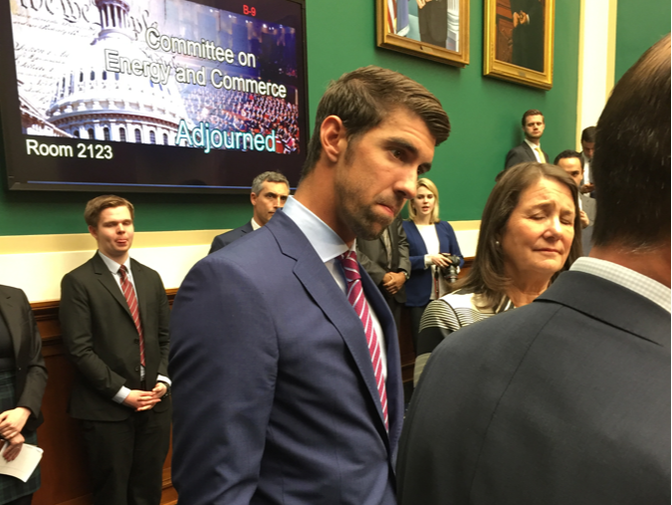|
By Aubrey Gelpieryn
American University WASHINGTON – Michael Phelps sat before the House Subcommittee on Oversight and Investigations Tuesday morning and told the Representatives that he didn’t think he’d ever participated in a “clean” Olympic Games. Phelps, who retired from swimming after winning his 28th medal in the Rio de Janeiro Games this past summer, shared a personal testimony of his experiences having known other athletes were using drugs to gain a competitive advantage. Though he had previously avoided talking about the subject, Phelps said that his newborn son is what inspired him to finally step forward and share his criticism of performance-enhancing drugs and why he never felt the need to partake in doping. “I put my body through pain that I’ll never see again, trust me. But it just needs to be fair,” said Phelps. For me, having a son, I want him to enjoy clean, fair sport.” A panel of witnesses, that included shot-putter and Olympic gold medalist Adam Nelson, United States Anti-Doping Agency Chief Executive Officer Travis Tygart, World Anti-Doping Agency Deputy Director General Rob Koehler and IOC Medical and Scientific Director Dr. Richard Budgett, joined Phelps as witnesses. The subject of anti-doping was particularly personal for Nelson. He was awarded his gold medal nine years after competing in the Olympics, when it was revealed that the competitor who had bested him did so with the assistance of performance-enhancing drugs. His gold medal, which he showed to the members of congress, was not given to him on the Olympic podium, but in an airport food court. After talking to congress, Nelson was ready for action to take place. “I think the first next step is for the IOC and WADA to actually follow up on what they talked about today. The fact that the IOC representative said that they’re going to consider separating sport from this particular element is a really big step,” said Nelson. “I’ve had the opportunity to represent my country in competitions all over the world, but to have the opportunity to come and represent clean sports in this particular venue is an element that you just don’t get to do very often.” Nelson said he hopes that “major changes” will result from this hearing. Subcommittee Chairman Rep. Tim Murphy. R-PA., said the hearing was important because it sent a message to American youths. “Sports should be a place where your determination and your skill, your focus, your psychosocial makeup are things that are the difference between a champion and just a competer,” said Murphy “Drugs should not be a part of it.” The topic of anti-dopoing is especially relevant after this past summer’s Olympics, during which time 68 Russian athletes were banned from competing due to positive tests, according to the BBC. Phelps described this incident as “frustrating.” He said that while he was tested 13 times in the six months leading up to the 2016 Games, sometimes being woken up at 6 a.m. on his off days to complete a test, athletes from other countries were allowed to participate even after testing positive twice.
0 Comments
Leave a Reply. |
Aubrey GelpierynAubrey Gelpieryn is a journalist currently in New York. She enjoys writing about music, politics and current events. Archives
January 2021
Categories
All
|


 RSS Feed
RSS Feed